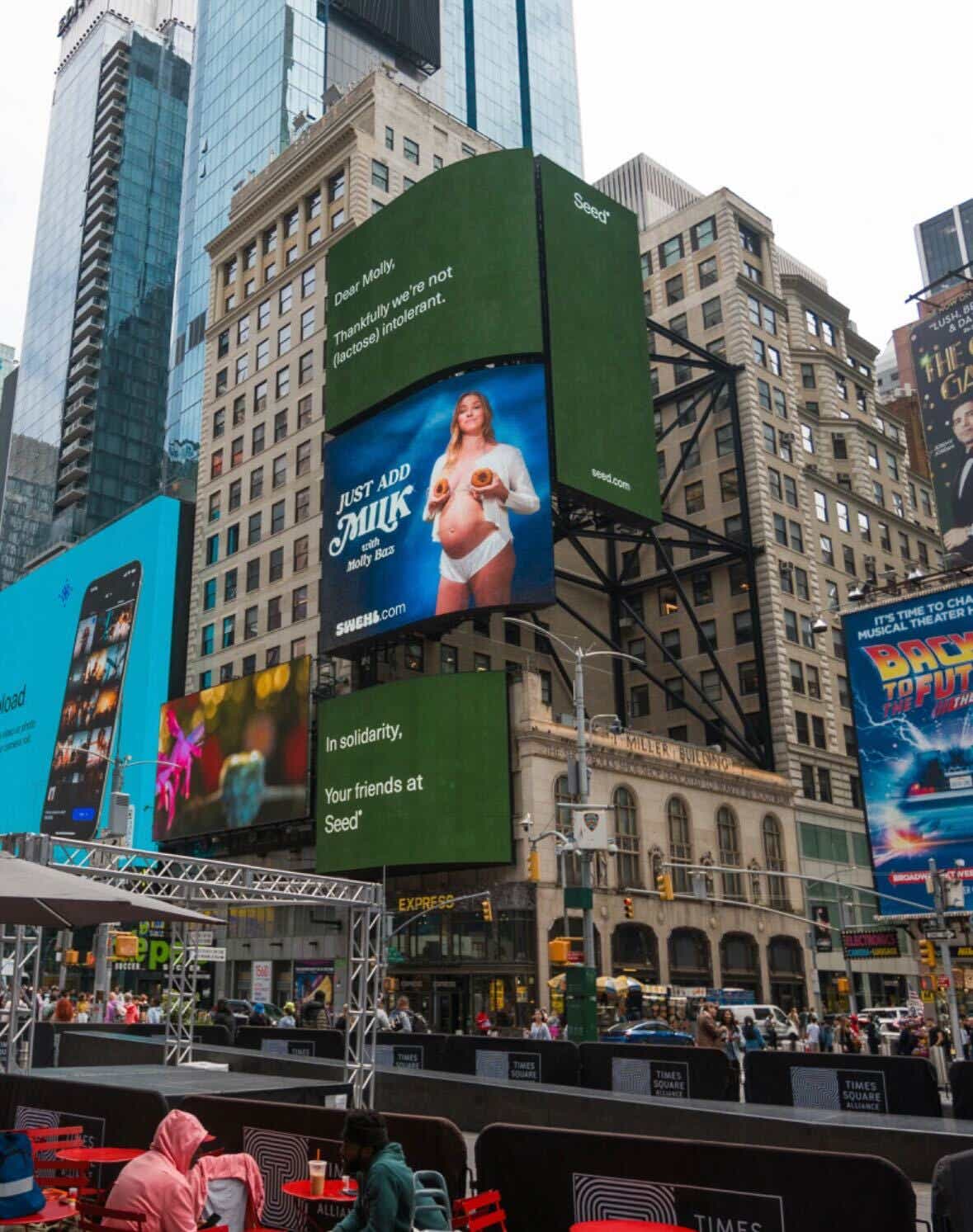You might remember in 2012 when the #FreeTheNipple movement took off online. The campaign pointed out the hypocrisy of the fact that social media algorithms, particularly Instagram's, censored posts of topless women because the platform bans nudity — while pictures of shirtless men, nipples and all, are everywhere you look. Now, the internet is up in arms about yet another double standard when it comes to women's bodies: A cookbook author is speaking out after an image of her pregnant belly was deemed "inappropriate" for her Times Square Billboard.
Lactation cookie billboard sparks drama
Earlier this week, Molly Baz, a chef and New York Times bestselling cookbook author, was featured in a 45-foot billboard in Times Square. The billboard advertised her lactation cookies, a recipe she developed and shared on Swehl, and directed viewers to the Swehl webpage where the recipe is located. The ad depicts Baz with her shirt open, wearing a rhinestone bikini, and holding two of the lactation cookies up to her breasts. Her belly is visible. The text above the picture reads, "Just Add Milk."
Baz told Katie Couric Media that the intention of the ad "was to bring some levity, and lightheartedness to a conversation that has historically been considered taboo. Breastfeeding wasn’t legal in all 50 states until 2018, and still, the stigma that surrounds it creates a narrative that suggests that there’s something to hide; something that is inappropriate about a woman feeding her child in public."
Swehl purchased the ad, which was supposed to run for a week, from May 6 through Mother's Day — but was pulled after just three days. The breastfeeding company used a fintech company called Brex to help them place the billboard, which was run through the advertising company Clear Channel.
There's some dispute over why, exactly, the ad was pulled. According to The New York Times, a Clear Channel representative told Brex that the lactation cookie ad violated “guidelines on acceptable content." Swehl told ABC News, "Molly and Swehl concepted our campaign to infuse fun and strength into this rite of passage; so you can imagine that our team was infuriated to hear the ad was pulled for being 'unacceptable' without any further context."
However, Brex later told ABC News that it had initially "misinterpreted" Clear Channel's directive and that the image was actually “flagged for review." So they swapped it out for a different image from the campaign, one that depicts Baz in jeans and a crop top.
The history of censoring breastfeeding
Author and journalist Liz Plank points out in a post on her Substack, Airplane Mode, that the billboard controversy is illustrative of a long history of breastfeeding people being silenced.
"Women who breastfeed in public are often stared at, or worse, asked to hide or leave," she writes. It gets worse: "For years, Facebook had an informal policy of straight-up deleting photos of women breastfeeding. And until recently, YouTube banned any monetization from creators who were shown breastfeeding."
Plank says, "All of this underscores a collective discomfort with the visibility of maternal roles in public spaces."
A double standard in advertising
Phoebe Bain, senior reporter at Ad Age, notes that this isn't the first time one of these large physical ad activations — called "out-of-home" (OOH) advertisements — has seemed to exhibit a double standard between male-focused and female-focused products.
In 2018, female sex toy company Dame worked with Outfront Media, a competitor to Clear Channel, on ads to be displayed in the MTA subway systems. Dame claimed that after spending $150,000 and creating three rounds of ads, Outfront and the MTA revoked the approval for the campaign, citing the MTA's ban on posting ads for “sexually oriented” businesses. Dame fired back that the MTA had previously run ads for erectile dysfunction products, the Museum of Sex, and dating apps with suggestive images and references. Dame eventually sued, alleging the policy violated First Amendment rights to free speech. The brand settled with the MTA in 2021 and eventually became the first female-founded pleasure company to run ads on the NYC transit system.
Bain says that "Out-of-Home is a pretty old school part of the advertising world. There aren’t really hard-and-fast rules" for how companies such as Clear Channel Outdoor or Outfront choose to interpret their brand safety guidelines on a case-by-case basis, which can allow for unequal enforcement.
Plus, bias can creep into people's perceptions of an ad and inform complaints — and if a company like Clear Channel or Outfront receives negative comments, they would conceivably have a financial incentive to pull the offending material.
"Consumers are used to seeing huge Victoria's Secret lingerie ads on billboards, but they might not be as used to seeing pregnant bellies," she says. "It's possible that seeing the female body when it’s intended to be viewed within the female gaze and not for men raises alarm bells in certain people's heads.”
Molly Baz speaks out after her ad is pulled
Baz tells KCM, "My outrage around the decision to take down the photo has grown incrementally by the day since it happened." She says that at first, she was simply puzzled and couldn't understand the decision to take down the image. "I mean, have you seen the other billboards that run day in and day out in Times Square?" she says. "Hypersexualized imagery of women (wearing much less than I was) is everywhere."
But the more she's thought about it, the more angry she's become: "At this point, I’m pretty furious and disheartened. The double standard around what is deemed acceptable, appropriate, and desirable with regard to the female body when it comes to advertising is outrageous and way past its due date for an overhaul."
But there has been a bright side. Liz Plank reports that "all of this hand-wringing increased the breastfeeding company’s traffic by 500 percent, which has given them more attention than they would have had otherwise."
Baz says, "Since the ad was replaced, and word got out, we’ve seen an outpouring of support from people who are just as outraged as we are. There is a lot of energy and momentum around the issue that we hope to use to continue to amplify our message."
When we spoke with the chef, she promised us the story didn't end here: "Rest assured, this will not be the end of the Big Titty Cookie campaign," she said, adding that the team was planning something "even bigger, splashier, and reaching an even larger audience as soon as possible." And now, we know what she was referencing...
Molly Baz's billboard returns to Times Square
The image that's become such a lightning rod over the last few days has been officially restored to the place where the story began. On Friday morning, the ad returned to Times Square, courtesy of the probiotic company Seed, which decided to continue the campaign in solidarity with Baz and Swehl. You can see the ad returned to its full glory here:

As you can see, the new version of the billboard contains a supportive note from Seed about the ordeal, and a rep tells us that Seed's decision "highlights the ongoing societal double standards that accept sexualized images of women while censoring natural representations of motherhood." The billboard will remain in Times Square until the first week of June.









